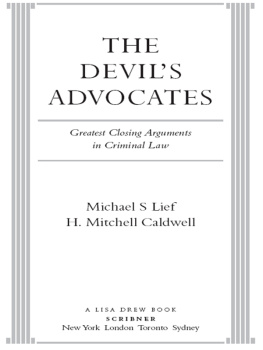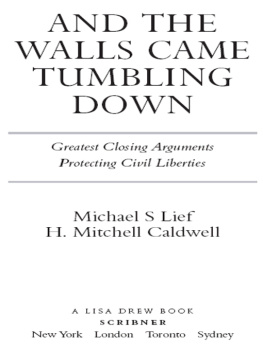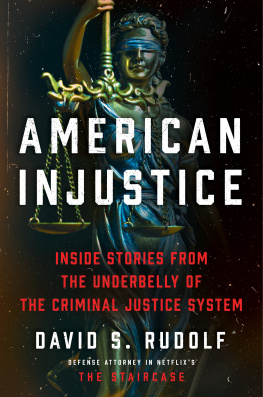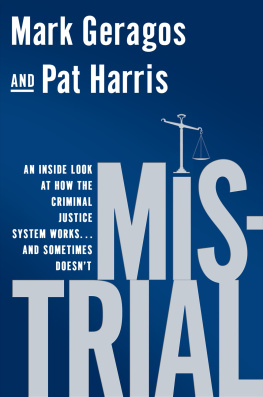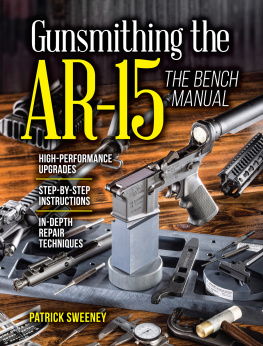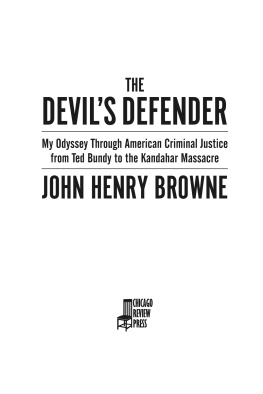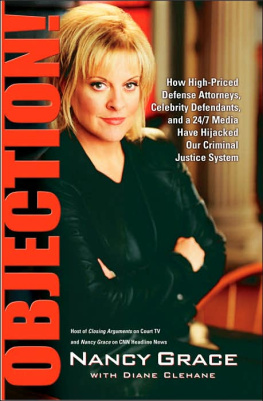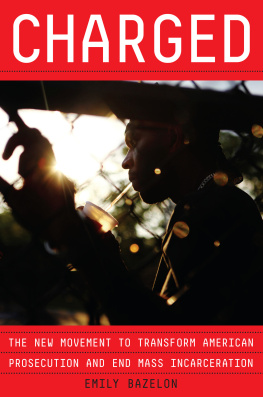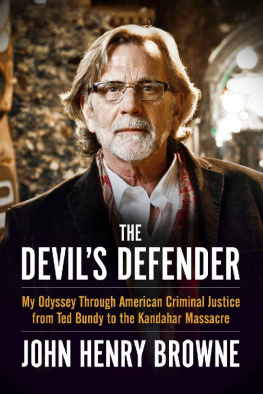Also by Michael S Lief and H. Mitchell Caldwell
Ladies and Gentlemen of the Jury: Greatest Closing Arguments in Modern Law (with Ben Bycel)
And the Walls Came Tumbling Down: Greatest Closing Arguments Protecting Civil Liberties

A Lisa Drew Book / Scribner
A Division of Simon & Schuster, Inc.
1230 Avenue of the Americas
New York, NY 10020
Copyright 2006 by Michael S Lief and H. Mitchell Caldwell
All rights reserved, including the right to reproduce this book or portions thereof in any form whatsoever. For information address Scribner Subsidiary Rights Department, 1230 Avenue of the Americas, New York, NY 10020.
SCRIBNER and design are trademarks of Macmillan Library Reference USA, Inc., used under license by Simon & Schuster, the publisher of this work.
A LISA DREW BOOK is a trademark of Simon & Schuster, Inc.
The Library of Congress has cataloged the hardcover edition as follows:
Lief, Michael S
The devils advocates: greatest closing arguments in criminal law / Michael S Lief, H. Mitchell Caldwell.
p. cm.
A Lisa Drew Book.
Includes index.
1. TrialsUnited States. 2. Criminal justice, Administration ofUnited StatesHistorySources. I. Caldwell, Harry M. II. Title.
KF220.L54 2006345.73'07dc22
2005057584
ISBN-13: 978-1-4165-7186-5
ISBN-10: 1-4165-7186-8
Visit us on the World Wide Web:
http://www.SimonSays.com
This book is dedicated to the memory of Shirley Weber Lief, 19061986, the card-playing, joke-telling, cigarette-smoking, most loving grandmother a guy could have. And to Sergeant Bernard Solomon Sands, USMC, 19331991, who loved brawling, books, booze, and broads, not necessarily in that order.
He would have enjoyed this book. Semper Fi, Mac!
MSL
For Joyce, my rock and my rudder.
HMC
Acknowledgments
The following law students contributed mightily to this book: Charity Hansen, Kasey Swisher, Tammy Tsoumis, Maralee Downey, Amanda Harvey, and Christopher Sun. And a special thank-you to Denise Coulter for her invaluable assistance with the Ossian SweetClarence Darrow chapter.
We would be remiss in not thanking Candace Warren, Marc Rivera, and Casey Critchlow for their skill and patience in processing draft after draft.
THE DEVILS ADVOCATES
Introduction
T HE C LOSING A RGUMENT C HRONICLES
In book one of our series, Ladies and Gentlemen of the Jury, we focused on compelling trials that featured the greatest closing arguments in American history: Clarence Darrow saving the lives of Leopold and Loeb, Gerry Spence bringing the nuclear power industry to its knees, William Kunstler taking on the Establishment. We also featured the successful prosecutions by Robert Jackson of the Nazi hierarchy, Vincent Bugliosi of Charles Manson, and Aubrey Daniel for the My Lai massacre.
Book two, And the Walls Came Tumbling Down, concentrated on landmark trials and their culminating arguments that redefined civil rights in America and profoundly affected the lives of all Americans: from the Amistad case, in which John Quincy Adams brought the injustice of slavery to the center stage of American politics, to the prosecution of Susan B. Anthony, which paved the way to success for womens suffrage, to the Larry Flynt trial, in which the porn king became the unlikely champion for free speech. In this book we also included the trial brought by Karen Ann Quinlans family asking the court to let their hopelessly comatose daughter die, and the McCarthy-era blacklist case in which master lawyer Louis Nizer whipped the forces of innuendos and lies.
And now in book three, The Devils Advocates: Greatest Closing Arguments in Criminal Law, we turn our attention solely to crimes. Theres something intriguing about real crimes, real killers and madmen and traitors, not just the celluloid creations of the Hollywood dream machine.
It is that intrigue that led us to write this book. As in our previous efforts, we are motivated by the belief that there truly is a best seat in the house to understand terrible crimes: its in the jury box. Victims may have understood why they were suffering so at the hands of others, but they rarely receive the opportunity to enlighten us. Killers and madmen may understand their motivation, but they often have strong incentives to lie to us. Eyewitnesses may present us with a thread of the tapestry, but not enough to give us a clear view of the whole.
But jurors! Jurors are presented with the most complete retelling, through the presentation of days, weeks, even months of testimony and evidence. And, at the end of the process, the lawyers present their arguments, summing up all that has gone before, weaving together each testimonial thread, combining the warp and woof of eyewitnesses and experts untilviol!the advocates step back and allow the tapestry to tell the story and persuade the captive audience. However, the audience has a far more active part to play than those seeing a theatrical production, for they will determine the outcome: Freedom or captivity? Life or death?
The Devils Advocates focuses attention on the types of crimes and trials that have so captivated the public, cases that have also helped to illuminate underlying principles of the American criminal justice system.
The United States of America is largely defined by how we treat those accused of criminal acts. Owing in large part to our English common-law traditions, America has continued to define and refine a system that presumes innocence until and if the state can establish beyond any reasonable doubt a persons guilt. And along the path beginning even before the birth of this nation, lawyers, judges, and legislators, as well as circumstances, have worked to hone Americas justice system. In this collection we have compiled eight remarkable, landmark cases, each of which either identified a protection or better focused a right that we as Americans have all come to expect.
We begin with the right to sanctuary. That is the guarantee that once an accused is taken into custody he or she will be safely sheltered from outside forces. Such guarantees are often hard-earned, as when a Tennessee sheriff turned a blind eye to a mob hell-bent on wrenching a man from jail and lynching him.
We then turn to the Fourth Amendment guarantee to be free from unreasonable search and seizure. While the Founding Fathers contemplated such protection, it went largely vacuous until in the late 1950s, when a single mother protested a warrantless search of her home. From such modest beginnings emerged the backbone of the American criminal justice system, the exclusionary rule, which excludes illegally seized evidence from trial.
Five years after establishing the exclusionary rule, the Supreme Court, frustrated at continued police violation of a suspects right to counsel and right to be free from self-incrimination, constructed the Miranda standard, which mandated that the police inform suspects of basic rights prior to interrogation.
There is also a basic right to be left alone, to live an unconventional life, even a strange life, free from the scrutiny of the state. That right was dramatically illustrated when self-willed outsider Randy Weaver was targeted by government agents, who would eventually shoot and kill his wife and son.
Also depicted is the most basic of rights, the right to a lawyer, a zealous advocate to represent even the despised and the vilified. It was for John Adams, who would later become the second president of the United States, to inaugurate a tradition that everyone, including the British redcoats involved in the Boston Massacre, must be represented. It remains one of historys great ironies that Adams, a leading voice for Americas independence from England, would risk his life and imperil his professional career as well as political future by defending the British soldiers who had shot and killed five American patriots.

